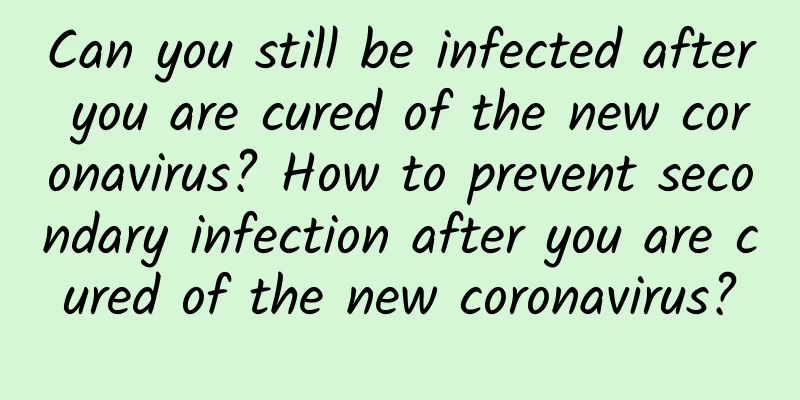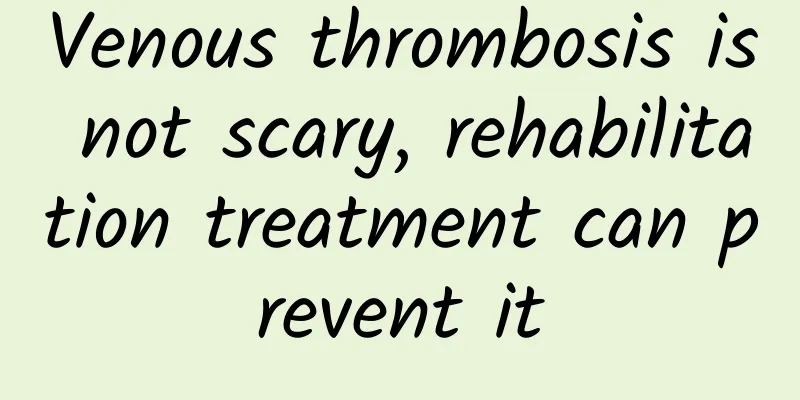Can you still be infected after you are cured of the new coronavirus? How to prevent secondary infection after you are cured of the new coronavirus?

|
The new coronavirus is a more difficult disease this year. It is highly contagious and many people have been infected and sick. After treatment, many new coronavirus patients have been cured and discharged from the hospital. So can the new coronavirus still be infected after being cured? Let's take a closer look! Can you still be infected after you recover from the novel coronavirus?It is possible. According to the general rules of viral infection, certain antibodies will be produced after viral infection, which will have a protective effect on the human body. However, some antibodies may not last that long, so these patients who have recovered are still at risk of reinfection, so cured patients should strengthen their protection. After the novel coronavirus is cured, protective antibodies will be produced in the body, so the cured person is safe for a period of time, but in the long run, the virus cannot be ruled out to mutate, so there is a possibility of secondary infection. Therefore, patients must also take good protection after being cured. How can cured patients avoid reinfection with the new coronavirus?1. After discharge, medical observation at home is still required There are many people who have recovered from the novel coronavirus, but it is possible that they will be infected with the novel coronavirus again. Therefore, after being discharged from the hospital, they still need to undergo home medical observation for 14 days, and it is necessary to measure their body temperature. 2. Wear a mask when going out Although you have been cured, you still need to pay more attention. After the medical observation period at home, those who have recovered from the new pneumonia need to wear a mask when going out. The mask should be N95 or medical surgical mask. Otherwise, it is best not to go out. 3. Wash your hands frequently to ensure hand hygiene You also need to wash your hands frequently to ensure hand hygiene. Use soap or hand sanitizer to wash your hands. Do not touch other things casually outdoors to avoid indirect secondary infection with the new coronavirus. 4. Avoid crowded places You also need to avoid going to crowded places, because there will be a lot of droplets in crowded places, which may lead to close contact with droplet infection. You must pay special attention to this. 5. Make sure the food you eat is cooked For the food you eat, make sure it is cooked thoroughly, because uncooked food will lead to a decrease in immunity and even diarrhea, which can easily lead to secondary infection. 6. Ensure good sleep quality It is also necessary to ensure good sleep quality, because good sleep can ensure that immunity will not drop significantly, which is very effective in preventing secondary infection with the new coronavirus. 7. Do not participate in gathering activities If you are invited to a gathering, do not go, because it is very likely to lead to secondary infection. Currently, more and more people are infected with pneumonia in groups. It is very serious. Will the novel coronavirus recur after recovery?For COVID-19, generally after recovery, there are still antibodies against the virus in the body, and generally there will be no recurrence in a short period of time. However, as time goes by, the antibodies in the body gradually weaken or disappear, and as the strain mutates, there is a possibility of contracting COVID-19 again. Therefore, for cured patients, it is not a one-time cure. Once infected with the virus, there is a possibility of recurrence. It is recommended that recovered patients still take personal protection measures. Are there any sequelae after the novel coronavirus is cured?We have found from clinical experience that the new coronavirus infection mainly affects the lungs. There should be no sequelae for patients with mild symptoms, but for severe patients, there may be some changes in lung damage and repair for a period of time, such as pulmonary fibrosis. From my clinical experience, the lungs have a very strong ability to repair, and most pulmonary fibrosis can be repaired. However, for a very small number of patients with extremely severe symptoms, some pulmonary fibrosis may remain for a relatively long time, and we need to strengthen follow-up in the later stage. Patients who have recovered should still pay attention to protection and prevent colds. In addition, rehabilitation should be strengthened. In the early stage, you can do some appropriate activities at home. As your physical strength recovers, you can increase the amount of activity. The amount of activity should be based on not feeling obvious fatigue. At the same time, we should also pay attention to psychological counseling and rehabilitation, because some patients may develop depression in the later stage after this disease. If necessary, we recommend visiting a psychological clinic. It is recommended that all patients go to the clinic for regular follow-up examinations, including lung function and CT, to facilitate our long-term management. |
<<: How to fry leftover rice in a non-stick pan? How to fry leftover rice if it is too sticky
>>: How to get to Chongming Island from Shanghai the fastest? Where to go to Chongming Island?
Recommend
What should I do if I can't hold back my poop during surgery?
Assume I mean hypothetically. You are lying on th...
What to do if you have no topics to talk about in a relationship? How to start a conversation in a relationship
Regarding the issue of having no topics to talk a...
What if my period is delayed for 20 days and I am not pregnant?
Menstruation is an important sign of female matur...
Treatment for low back pain in late pregnancy
Many pregnant mothers experience back pain in the...
Medication management in kidney disease: how to use medications correctly
Kidney disease refers to a type of disease that c...
"Sleep for 12 hours after drinking it." This bottle of drink is regarded as a "sleeping magic tool" by netizens. Is it really effective?
"Anyone who has trouble sleeping should drin...
How to treat stomach discomfort during pregnancy
It is common for pregnant women to have stomach d...
What are the symptoms of multiple breast cysts?
Breast cyst is a relatively common breast disease...
Are breast cysts serious?
Modern women are under increasing pressure in wor...
A woman dreams of a unicorn
Everyone dreams when they sleep, and the dreams a...
What are the main methods for preventing breast cancer?
The prevention of breast tumors is an issue that ...
How to wear down jackets to look good and keep warm? 2019 winter down jacket fashion wearing tips
Down jackets are the most popular item for people...
Can women eat watermelon during confinement?
Women need to pay attention to their bodies durin...
What should women pay attention to when they have kidney deficiency and low back pain?
I believe that many female friends have experienc...
The consequences of taking birth control pills for many years
Emergency contraception is the most common contra...









